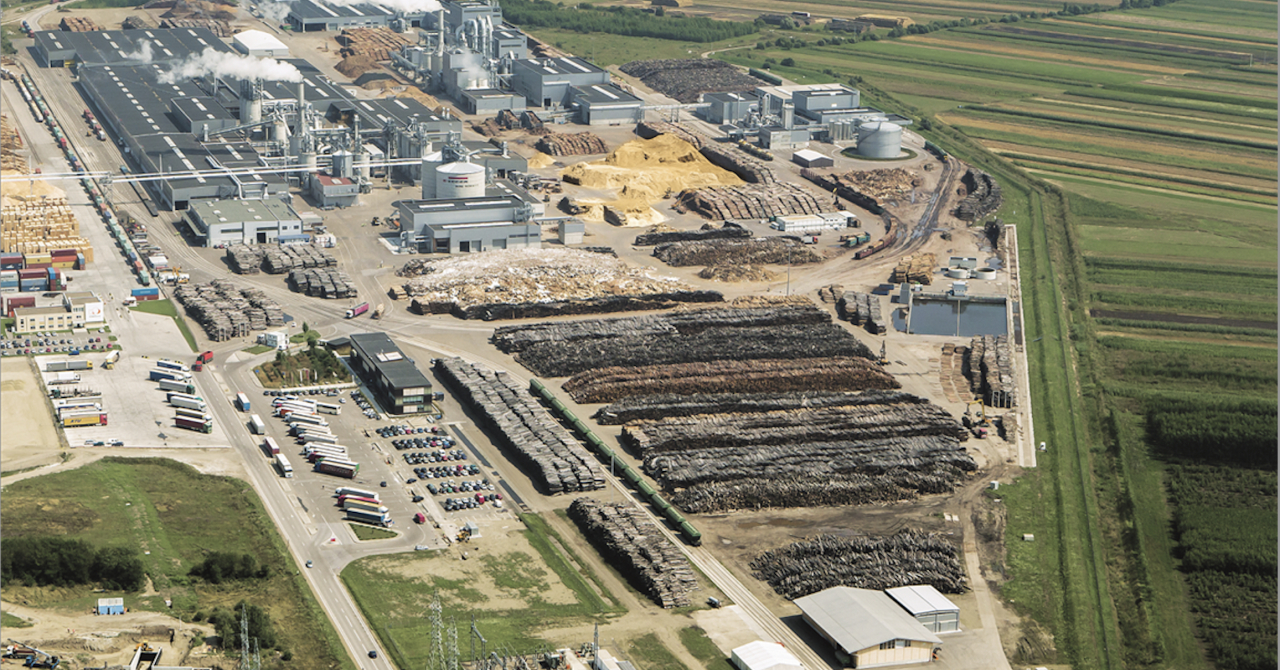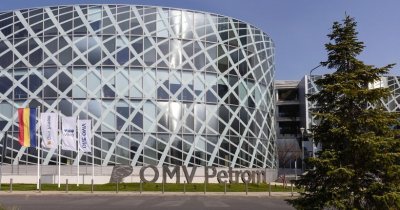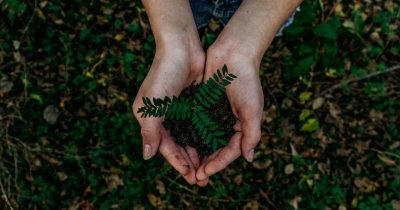Experts at EGGER offered us multiple details about how the company processes not only virgin wood, but also used wooden products, which they turn into new goods that can be used for constructions, for example.
EGGER is a family company that originated in Tyrol, Austria back in 1961 and which nowadays counts 22 production units in 11 countries around the globe, where some 11.000 specialized employees work.
We talked to Alina Chifan, Commercial Director of EGGER Romania to find out more about the company's activity in our country, where it gets its wood resources and why recycling is a key component for the business.
Ever since the company was founded, wood was viewed as valuable resource, which must not be wasted. Thus, the founder, Fritz Egger, wanted to use everything that resulted from wood manufacturing and with time, the technological progress allowed a more efficient use of the material.
The EGGER Group started manufacturing wood products in Romania from 2006 and ever since, according to Alina Chifan, the number of employees increased rapidly, meaning that now, there are around 880 specialized employees working for EGGER Romania.
"At EGGER, we wanted to develop our own learning programs. Recruiting and shaping the next generation of specialized wood manufacturers remains as one of our main objectives to this day, especially since we want to offer more young people new job opportunities", says Alina.
A wide range of sustainably-produced wood goods
At EGGER Romania a number of wood products are being manufactured for furnishing and interior decoration, as well as wood constructions. "We strive to act sustainably, conservating our resources and protecting the environment", says the Commercial Director of EGGER Romania.
The sustainable activity at EGGER Romania is shaped by three main pillars, as per Alina Chifan. The first one is about the products that exit the production line, since these are being validated by third party environmental product declarations as sustainable goods.
"A declaration contains the results of the evaluation of the product's lifecycle analysis. This data allows planners, designers and engineers to make more informed comparisons on environmental performance. Our statements are being verified by the Institute of Landscape Architecture and Environmental Planning in Berlin", the representative of EGGER Romania said for Green Start-Up.

Sustainable production is the second most important environment component for the company. Thus, we learned from Alina that "in order to answer the best to each specific needs, the factory locate in Rădăuți made its own management program for energy and environment, with additional goals, outside those Group-related. EGGER Romania uses the latest available technologies when it comes to the equipment."
The company uses a special concept, called cascade utilization, to ensure that all of the wood resources are being used to the maximum, meaning that only the unrecyclable wood is being used for energy production.
"Due to a closed-loop production, the waste stream is low. These are being generated, most of the time, during the finishing process - such as lamination -, when eliminating the edges or when packing supplied pre-products, but also during maintenance", as per company officials.
All of the wood waste generated during the production processes that take place at EGGER is being stored and sorted so that it can be used during future production. Also, byproducts and wood residue are being refined into wood-based materials or if recycling is not possible due to a lower quality, they are being purposed for heat and green power generation in the biomass unit at Rădăuți.
According to company representatives, "our strategic purpose is to reduce the volume of stream waste by 10% by 2025, compared to year 2018."
Sustainable production with fewer fossil fuels
EGGER Romania works continuously in order to give up on using polluting fossil fuels. Thus, as per EGGER Romania, "we promote integrated energy concepts that have the highest energy efficiency coefficient, while also bringing cost savings during energy generation. Thus, 76% of the fuel we use is renewable biomass, generated in Rădăuți. Over half of the energy requirements for the platform come from renewable power, generated in this very unit."
"Every year we are interested in enhancing our performances by reducing our carbon footprint and using renewable energy", the representatives added.
Group-wide, EGGER transports about 518.000 tons of wood-based products every year and 34% of those are being sent out by railway, compared to 25% in 2020. The factory located in Rădăuți has an advantage in this regard, as the railway system reaches the unit itself, meaning that road transport is not necessary and thus, overall transport emissions are being lowered.
"The following principles apply as this: whenever it is logistically and economically possible, we use railway and maritime transport, especially when it comes to the transport that takes place between Group-wide factories and over long distances", Alina Chifan told us.
How wood products are being manufactured sustainably
Besides wood, water is also another important resource when it comes to manufacturing pretty much every product that surrounds us. To contribute to a cleaner and greener environment, EGGER focuses continuously on optimizing water use, but also on enhancing its quality. At the same time, the company works on recycling production water, so that it can manufacture more products with less freshwater.
 Thus, "the used water is being repurposed for production, after it's been through a filtration process or treated chemically. For example, the water from the heating unit's cooling towers is being reused for other purposes on the platform, such as washing logs or defrosting them during winter. Besides the running water, we also use rain water and underground water resources", EGGER Romania's Commercial Director said for Green Start-Up.
Thus, "the used water is being repurposed for production, after it's been through a filtration process or treated chemically. For example, the water from the heating unit's cooling towers is being reused for other purposes on the platform, such as washing logs or defrosting them during winter. Besides the running water, we also use rain water and underground water resources", EGGER Romania's Commercial Director said for Green Start-Up.
The primary wood material used by EGGER for production was acquired from authorized companies working in wood production and the company's suppliers are periodically verified to check on the source where the wood comes from. "We check on all new wood suppliers, which allowed us to have a 100% share of verified wood so far", we learned from EGGER Romania representatives.
EGGER is one of the first wood products manufacturers in the world that was certified according to the standard ISO 38200 Chain of Custody (COC) for the supply chain with wood and wood-based products.
The wood recycled by EGGER Romania is mostly used for manufacturing particle boards, those being the prime matter for manufacturing furniture. For manufacturing particle boards, EGGER Romania was able to use 20% recycle wood in the production process of these materials, thanks to the company's five collecting centers. At EGGER, out of all of the material used for manufacturing PAL boards, 83% is made from byproducts and recycled wood.
"We also use recycled wood waste, meaning materials used and thrown by the end user, which are being collected as waste, such as transport boxes made from massive wood, pellets untreated construction wood, panels or doors. These are being collected by each of our five Timberparks in Romania, located in Bucharest, Cluj-Napoca, Arad and Brașov", according to EGGER Romania officials.
During the decade-old process of collecting wood waste, EGGER integrated about 34.000 truck loads worth-of recycled wood. In 2022, the company surpassed 21% recycled wood in the production of PAL boards, with the main goal for 2025 being a 25% share.
As far as emissions-free mobility goes, EGGER Romania bets on railway transport, but the company also integrates strategies to encourage the use of electric vehicles.
Thus, at the factory located in Rădăuți, there is a charging station dedicated to battery-powered vehicles and the representatives told us that the network will be extended in the future, both for employees, but also for visitors.
The next steps for EGGER Romania
EGGER Romania established three main environment-related objectives for the next year, first being an overall reduction of greenhouse gas emissions by 15% by 2030, compared to 2018.
"The second objective we set is reducing the power consumption by 10% before 2030, also compared to 2018. And the third is reducing stream waste by 10% by 2025 compared to 2019 levels."
"At the same time, we continue our strategy to open new collecting centers for wood waste, which will be added to the current five", Alina Chifan, Commercial Director at EGGER Romania concluded.
 Mihai - Cristian Ioniță
Mihai - Cristian Ioniță












Any thoughts?